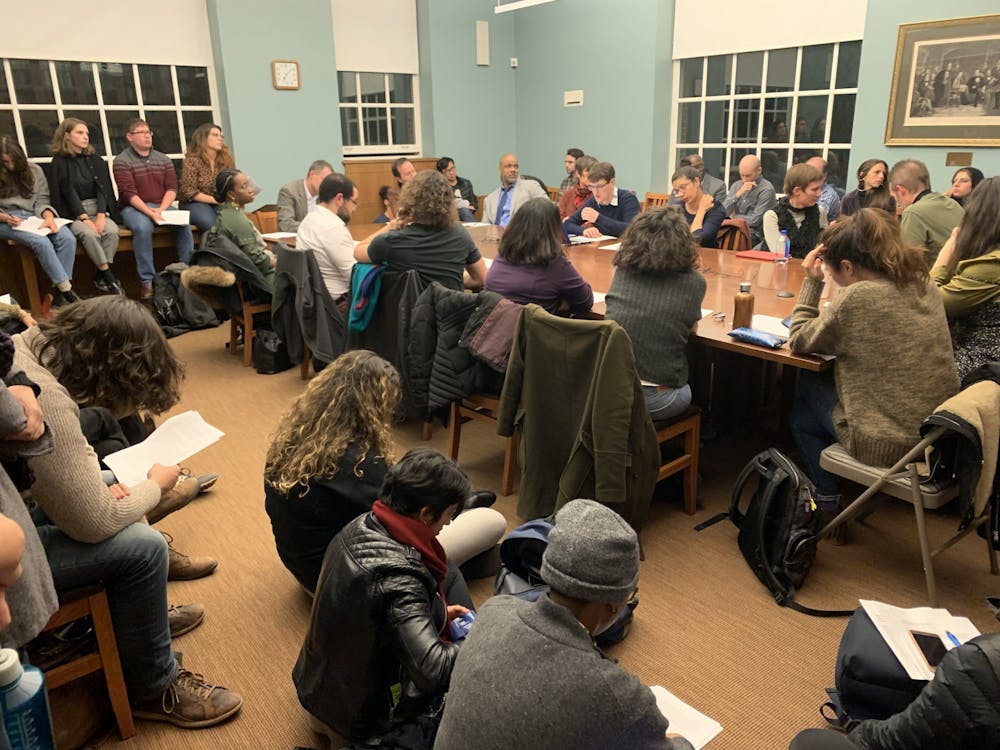Co-Director of the Program for the Study of Women, Gender and Sexuality (WGS) Todd Shepard announced in a recent email that the University was canceling its long-standing WGS Teaching Fellowships. These fellowships have allowed graduate students in all disciplines to teach undergraduate courses in feminist and queer history and theory.
In response to the decision, current and former fellows authored an open letter and a petition on Nov. 7 calling for the University to address their concerns. As a result, Vice Dean for Graduate Education and Centers and Programs Matthew Roller attended a WGS town hall on Wednesday. Shepard moderated the discussion.
Jo Giardini, a PhD student in the English department and a WGS graduate liaison who helped author the open letter, voiced their concerns about the cancellation of the fellowship in an interview with The News-Letter.
“I am just really distressed by the idea that designated fellowships, for issues that are especially pertinent for queer and trans and feminist students, are being taken away with no promises that they will be replaced by opportunities elsewhere,” they said.
Giardini was disappointed by the outcomes of the event.
“What I wanted to get out of this was a sit-down meeting with someone who was… able to both be accountable to the decisions that have been made and begin to weigh the possibilities of rectifying the problem that has been created by the Dean’s office,” they said.
However, Giardini explained that this sit-down was not possible, in part because the Dean of the Krieger School of Arts and Sciences, Beverly Wendland, was not able to attend. Giardini expressed hope that Wendland will be available to address their concerns in the future.
The event followed a structure of questions from various members of the town hall and then responses from Roller. Several concerns were raised by members of the town hall about where the money from the fellowship was going, why the fellowship was being cancelled in the first place and what considerations, if any at all, went into the decision of cancellation.
Roller began by stating his concerns with the lack of equity that historically existed across departments at Hopkins, as well as the current inadequacies in programs and departments that are not adequately compensating graduate students for their work and time.
He later explained that the Dean’s Teaching Fellowship (DTF) did not receive enough completed and full applications.
“The Deans would love even more DTFs if they could find the people to teach them, but it seems as if maybe we’ve saturated the market for the number of people we have,” he said.
Erini Lambrides, a PhD student and graduate worker, shared her frustration with The News-Letter upon hearing that equity was used as an excuse for why the specific fellowship program got cut.
“The nature of why it’s not applicable to homogenize the WGS fellowships under the Dean’s Teaching Fellowships umbrella was pretty much ignored, and so that makes me feel that this decision wasn’t really made with the input from the people who are most affected by it,” she said.
Maya Nitis, a fifth-year graduate student in the Department of German and Romance Languages and Literatures, emphasized the difficulty that graduate students face when trying to teach courses outside of their department.
“I was told by both my advisor and the head of my department that...the focus needed to be in German specifically, rather than WGS. It was only the WGS fellowship that allowed me to do this specifically in the WGS curriculum, which was super helpful,” she said.
Giardini believes that Roller could have better prepared for the event.
“He hadn’t read the doc that had been circulated by the current and former teaching fellow or clarified much of the facts on the ground prior to coming here, as was evident from his continued back and forth with Todd Shepard about the history of the program,” they said.
However, Giardini added that they appreciated Roller’s attendance.
“I imagine it is deeply uncomfortable to be facing down a room full of this many people such that it spills over onto the floor who are upset over a decision that you are responsible for,” they said.
In an interview with The News-Letter, senior Reah Vasilakopoulos, currently taking a class with one of the fellows, expressed her frustration upon leaving the event.
“Sitting in this space, understanding that people are not being fully supported and yet we’re still losing funding and we’re still losing this direct track to incredible and creative classes, was really disheartening for me,” she said.
Vasilakopoulos further explained how she thought a lot of points being brought up were impressive and thoughtful, but that Roller did not address them.
“He just ignored all the questions that were being posed and just continued to brainstorm with the folks who were offering solutions without actually responding to the direct concerns that people were saying,” she said.
Similarly, Giardini wished that participants’ concerns had been better addressed and that Roller had promised participants opportunities to follow-up.
Lambrides highlighted the importance of the Deans involving those impacted by their actions in the decision making process.
“If the University wants to keep having large fractions of its faculty, graduate students and undergraduate students frustrated with them, then they should keep on doing what they’re doing,” she said. “If they’re seriously thinking about making this an equitable and important place of higher education learning — we’ve been saying this for years and years now — involve the people who are affected by your decision in the decision making.”





